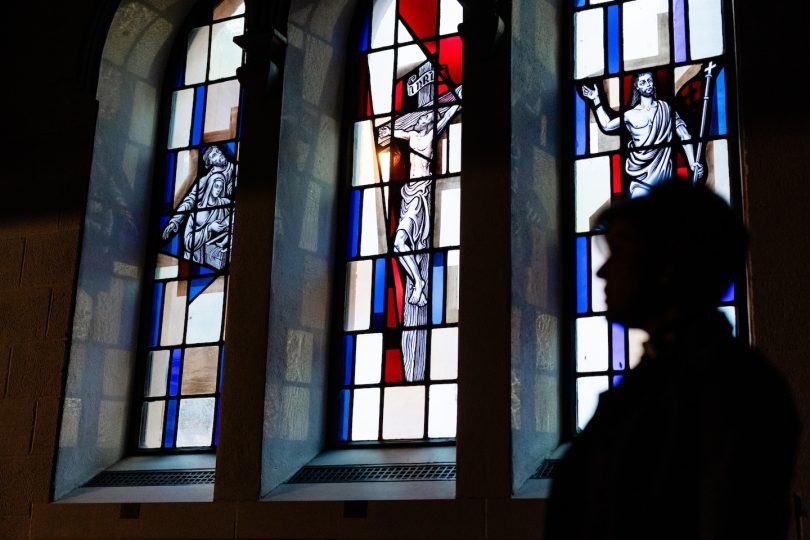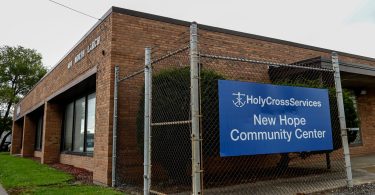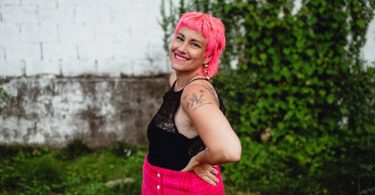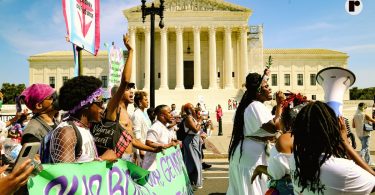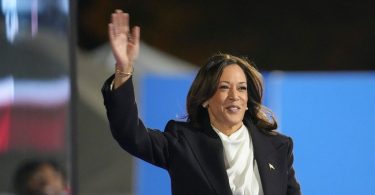NASHVILLE — The faith community is housed downtown in a 150-year-old church hall, with traditional wooden arched beams and towering stained-glass windows.
And yet it didn’t feel like any church Jessica Stacey Lynn had ever encountered. Pastor Dawn Bennett began her Sunday sermon at 7 p.m., after the soft blanket of nighttime had settled, giving the gathering a cozy, almost clandestine feel. She never mentioned hell — or even sin — when preaching. Instead, the focus was on love and healing — the same lessons from the Bible that had always appealed to Lynn.
Lynn discovered the Table on Facebook shortly after its launch in April 2020. Its social media pages described it as a community for people who had suffered from religious trauma, and it was specifically centered on LGBTQ people like herself, a transgender woman. She had come out just a few months earlier, in January, at the age of 58. At the time, she considered herself agnostic, but she began tuning in to the church’s live streams, fascinated by Bennett’s gentle yet upbeat demeanor and how she read from the Inclusive Bible — a modern translation with no gendered language.
The Style section
End of carousel
“For the first time, I feel I can actually believe that if there is a God, maybe they actually do love me,” Lynn said. “If I was created by God, then I was created this way.”
Raised Southern Baptist in east Tennessee, Lynn remembers knowing she was a girl ever since she was a child. But a combination of religious, familial and military pressure — she served in the Air Force after high school — forced her to keep it deeply buried. Still, “it would poke its ugly little head out from time to time, and I would get depressed,” she said. Years spent listening to preachers talk about eternal hell and damnation “had been so drilled into me that it honestly scared me,” she said. In October 2019, the sense that she was in the wrong body became so overwhelming that she attempted suicide. “I realized that I had to let this out; otherwise it was going to kill me,” she said.
Lynn became one of the church’s charter members when in-person sermons began after the pandemic. At the pulpit, Bennett, in a pair of rainbow-striped high-tops, preached about how LGBTQ people have been mistreated and misrepresented by conservative Christianity. “And I think that’s true for Jesus also,” Bennett said. “He gets a bad rep, especially from the queer community, because he’s so misunderstood.”
To Bennett, Jesus is a proud liberal who cares deeply for those shunned by mainstream society.
“The idea [for the Table] came to me after years of seeing gay people here destroyed by religion,” said Bennett, who was organizing a meal train for a transgender member recovering from affirming surgery when The Washington Post visited.
Many denominations and individual churches have moved to become accepting of LGBTQ people in recent years. In Nashville alone, the number of churches that affirm LGBTQ people — meaning they do not consider homosexuality or transgender identity a sin — has increased by 50 percent over the past decade.
But spaces such as the Table remain on high alert.
Many churches have experienced schisms over the issue: Since 2019, the United Methodist Church — the country’s second-largest protestant denomination — has lost more than 6,000 congregations over its move to welcome LGBTQ people. Meanwhile, a number of bishops around the world rejected Pope Francis’s decision in December to allow same-sex blessings in Catholic churches.
There has also been a noticeable uptick in violence. Affirming churches in Texas and Ohio have been firebombed. Several have been vandalized. Five miles south of the Table, a United Methodist church had a brick thrown through its window shortly after announcing it would welcome LGBTQ people. There have been protests outside the Table, and Bennett has received death threats. These intensified during Tennessee’s recent legislative periods, which resulted in a ban on gender-affirming care for minors and an attempt to outlaw public drag shows. When the Table hosted a Drag Queen Story Hour in June, members of the neo-Nazi National Justice Party showed up outside.
Bennett said the situation for LGBTQ people in the state “has gone from difficult to dangerous” in recent years. “It’s a sacrilege; it really is,” she said of the violence directed at churches. “It breaks my heart that churches are being vandalized.” However, she’s adamant that “if Jesus was walking here today in his own flesh and blood, he would give [churches that accept LGBTQ people] a big thumbs up, and he would be standing right there with them.”
It requires vigilance to maintain her spiritual haven. When she gives Communion, she walks to the pews instead of inviting people to the pulpit — not everyone feels safe showing their face on the live stream. The front door locks and a video screen at the back of the hall shows whether anyone is lurking out front.
Pastor Greg Bullard is Nashville’s longest-serving openly gay pastor. Originally from rural Alabama, he’s a proud Southerner and, as he puts it, “simple pig farmer.” Bullard is a vibrant presence at sermons, leading his Covenant of the Cross congregants as they bounce in the aisles to the church band, which features his 10-year-old son enthusiastically playing the drums. When The Post visited, the congregants gathered for a chili cook-off immediately after worship, mingling jovially as they tucked into loaded plates.
Member Sarah Myatt, whose sister identifies as queer, said she decided to leave the Southern Baptist Convention three years ago because she “couldn’t stand hearing them talk as if they hate my family.” She finds Bullard’s evangelical nondenominational church to be more positive and less restrictive.
“It’s funny; this is the most hated group of people in America, but they manage to be the most joyful,” she said.
Despite the upbeat atmosphere, Bullard keeps a watchful eye on his surroundings. His church is intentionally tucked away at the back of an outlet mall, and you can only find it if you know where you’re going. There’s always someone monitoring who comes in the door, and cameras on the roof link to an app on Bullard’s phone.
Bullard doesn’t believe there’s been an increase in violence against inclusive churches. “It’s an increase in reporting,” he said, adding that he has received threats ever since pastoring his first church back in the ’90s. In his view, as more mainstream churches change their stance on LGBTQ inclusion, they’re simply facing what pastors like him have already been dealing with for years.
Despite these challenges, Bullard believes that the shift toward welcoming LGBTQ people is a pragmatic choice. “If [some of them] didn’t become affirming, they were going to close,” Bullard said. “It’s just true!”
It’s not uncommon for LGBTQ people raised in conservative religious environments to reject faith entirely — overall, LGBTQ people in the United States are significantly less religious than the general population. Affirming churches aren’t just challenging Christians’ views of LGBTQ people, but also queer people’s views of religion, what it stands for and who it helps.
When Amiee Sadler was growing up, her predominantly Black United Methodist congregation was her entire world. She was a youth leader and dreamed of eventually becoming a youth pastor, and the church even funded her college scholarship. But that was all cut short spring break of her freshman year, when she was outed to the congregation.
The pastor took her to one side to pray over her. “I told him, ‘I appreciate the concern, but I don’t think there’s anything wrong with [being gay],’” she recalled. In response, he barred her from working with the youth congregation and ordered her never to return. Her scholarship was taken away, forcing her to drop out of college the following semester. Soon after, she found herself homeless after leaving an abusive relationship.
“I grew up believing that the church was supposed to be [the place that would help me],” Sadler said. “But I knew I couldn’t go back to the church and ask for help. Because they already told me they didn’t want me because of who I loved.”
Today, Sadler is a trustee for Nashville’s Launch Pad, an organization providing shelter for unhoused LGBTQ young people. It’s supported by a network of affirming churches, including one belonging to the United Methodists — the very same denomination that expelled Sadler two decades ago. Seeing this shift in attitudes has “restored her faith,” she said.
“There were many, many nights I felt like the world would be a better place just without me in it,” Sadler said. “And having that glimmer of hope that there was something bigger for me kept me going. If we are accepting and affirming, we are keeping people alive.”
Nashville is a city that leans liberal — a blue bubble in a deep-red state. Out in more rural areas, affirming churches don’t have the same kind of community support networks, which can leave them feeling more vulnerable if they are threatened.
The United Church of Cookeville is located on an inconspicuous residential street on the outskirts of Cookeville, a town of 35,000 people 1½ hours east of Nashville. A member of the United Church of Christ, a socially liberal denomination, it was the first LGBTQ-affirming mainline church in the area when it opened 20 years ago. A key feature of its theology is that it does not take the Bible literally.
Pastor Brian Wilmoth said the church has always kept its head down and maintained a low profile. So the congregation was taken aback when two men and one woman turned up to film a sermon in April. One — who appeared to be the ringleader — approached Wilmoth and aggressively questioned his church’s beliefs — including its acceptance of LGBTQ people. “You say you accept everyone, but you won’t accept me?” he asked tauntingly as Wilmoth instructed him to leave.
The man in question was a YouTuber and TikToker with 250,000 followers called Bronson “Bo” Alford, who goes by the alias Bodittle. He uploaded an edited version of the incident the following day under the title “I got kicked out of an LGBTQ church … again.” The church’s email inbox immediately began filling up with hateful and threatening messages from all over the country. “For a week and a half, it was just constant,” Wilmoth said. The team member who was monitoring the inbox, who identifies as a gay man, had to stop reading them.
The threats eventually petered out, but the incident left a mark. “As a pastor, you’re conditioned to protect your flock,” Wilmoth said. “And one of the things that hurts me the most is that I was unable to do that.” For the LGBTQ members of the church, “that’s what they live their life being afraid of — being attacked,” he said. The church called in law enforcement for a threat assessment, and local police stepped up neighborhood patrols for several months afterward.
Wilmoth’s anxieties were not baseless. After Alford made a similar video at another church in Plano, Tex., on June 25, it was firebombed a few weeks later. No perpetrator has yet been caught.
For RG Cravens, an analyst at the Southern Poverty Law Center, such attacks are a part of a long history of far-right groups’ targeting places of worship, “especially those spaces that empower minoritized groups.” Black churches have been targets of hate for decades — from the bombing of the 16th Street Baptist Church in Birmingham, Ala., by the KKK in 1963, which became a pivotal moment for the civil rights movement, to white supremacist Dylann Roof’s 2015 church shooting in Charleston, S.C. Cravens said attacks on affirming churches fit a wider pattern of how U.S. hate groups are increasingly targeting LGBTQ communities.
Wilmoth hopes that the violence does not deter other churches from changing their stance on LGBTQ issues. “I’ve always said that rural areas need more churches like this,” he said. “Because there’s nothing else.”
Affirming churches still make up the minority of Christian congregations in the United States, but the internet is opening up new spaces for LGBTQ Christians to explore and reinterpret their faith. Since the Table’s founding, people have watched the live streams from all over the world — even as far away as Africa. LGBTQ-focused churches in other cities, such as Denver’s House for All Sinners and Saints, also upload their sermon recordings. Platforms such as Queer Theology have become important resources.
Back in Nashville, Lynn hopes that as the Table grows, it will continue helping others the way it has helped her. Despite threats against affirming churches, Lynn feels a sense of safety and comfort every time she steps through the Table’s wooden doors and takes her place toward the front of the pews.
Bennett “really loves her congregation, and we love her,” she said. “She’s very protective of us, mainly because we’re different.”
In the meantime, Lynn doesn’t plan on ever again trying a new church. “Because you’re still going to hear about sin and hell and damnation and all that,” she said. “And I’ve had a lifetime of that already.”
Reporting for this story was supported by the Heinrich Boell Stiftung Transatlantic Media Fellowship.

